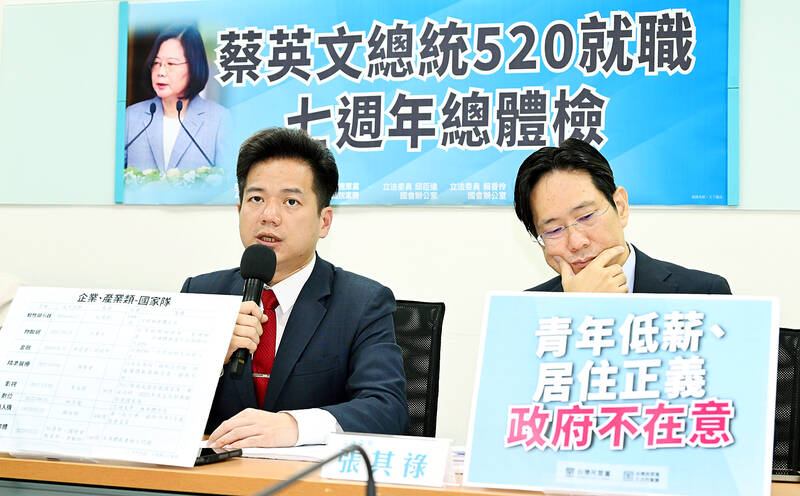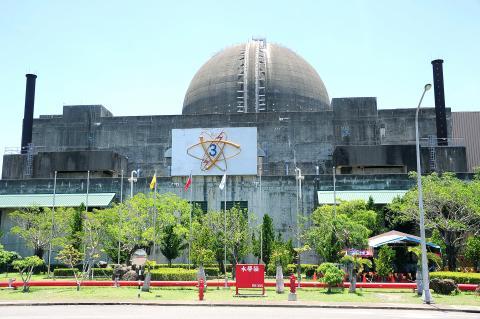Opposition parties yesterday criticized the policies of President Tsai Ing-wen (蔡英文) ahead of a speech she has planned for this morning to mark seven years in office, while the Democratic Progressive Party (DPP) separately defended her record.
The Tsai administration has established 30 “national teams” and 10 “special project offices,” but has had little to offer in terms of policy implementation and actual governance, Taiwan People’s Party Legislator Chiu Chen-yuan (邱臣遠) told a news conference in Taipei.
The appointment of people who lack professional knowledge to task forces is a sign of politics superseding professionalism, Chiu said.

Photo: Liao Chen-huei, Taipei Times
The DPP must face internal administration and foreign diplomacy challenges instead of attempting to rule by sloganeering, he said, urging the administration to focus on traffic safety, economic growth, helping industry and improving diplomacy.
New Power Party (NPP) Chairwoman Claire Wang (王婉諭) said that while the Tsai administration should be commended for upholding the nation’s autonomy and performing well on the diplomatic front, its double standards on government corruption have been a failure.
Honesty and public integrity are the least the public can expect from politicians, Wang said, adding that the DPP, as the majority party in the legislature, must take full responsibility for government failures.
The only way to ensure government oversight would be to deny the DPP and the Chinese Nationalist Party (KMT) legislative majorities, she said.
Taiwan Statebuilding Party Chairman Wang Hsing-huan (王興煥) said that the Tsai administration performed well regarding COVID-19 prevention, but its social reforms were lackluster, while its national defense platforms were outright failures.
Tsai’s performance over the past seven years has been a letdown for the younger generation that voted for her, KMT Legislator Johnny Chiang (江啟臣) said, citing polls from the Foundation for the People. Chiang is chairman of the foundation.
Despite being elected on promises to make Taiwan a better place for young people, Tsai received an average of 4.03 out of 10 among respondents under 40 years old, Chiang said.
The poll was conducted on Facebook from Monday to Wednesday targeting people aged 20 or older. It garnered 1,200 valid responses and claimed a margin of error of 2.83 percentage points and a confidence level of 95 percent.
Tsai is to give a speech at 9am today focusing on thanking people for their support and the Cabinet for its hard work, and affirming that the government’s efforts over the past seven years have redefined Taiwan and allowed the international community to see the nation in a new light, the Presidential Office said.
The speech would also touch on Taiwan’s pivotal role in the global supply chain and its critical location in the region’s geopolitics, it said.
At a separate news conference, DPP legislators touted the administration’s work.
The Tsai administration oversaw multiple hikes of the minimum wage, increased the tax waiving threshold for unmarried people to NT$416,000 (US$13,559) from NT$303,000 and increased rental subsidies to NT$300 billion last year from NT$2 billion in 2016, DPP Legislator Liu Shih-fang (劉世芳) said.
DPP Legislator Wang Ting-yu (王定宇) said that the nation’s defense industry has improved greatly under Tsai and that the national defense budget comprised 2 percent of GDP.
The level of international support for Taiwan is unprecedented and one of the reasons for this achievement is the success of the government’s policies, DPP Legislator Lo Chi-cheng (羅致政) said.

A fugitive in a suspected cosmetic surgery fraud case today returned to Taiwan from Canada, after being wanted for six years. Internet celebrity Su Chen-tuan (蘇陳端), known as Lady Nai Nai (貴婦奈奈), and her former boyfriend, plastic surgeon Paul Huang (黃博健), allegedly defrauded clients and friends of about NT$1 billion (US$30.66 million). Su was put on a wanted list in 2019 when she lived in Toronto, Canada, after failing to respond to subpoenas and arrest warrants from the Taipei District Prosecutors’ Office. Su arrived at Taiwan Taoyuan International Airport at 5am today on an EVA Air flight accompanied by a

An essay competition jointly organized by a local writing society and a publisher affiliated with the Chinese Communist Party (CCP) might have contravened the Act Governing Relations Between the People of the Taiwan Area and the Mainland Area (臺灣地區與大陸地區人民關係條例), the Mainland Affairs Council (MAC) said on Thursday. “In this case, the partner organization is clearly an agency under the CCP’s Fujian Provincial Committee,” MAC Deputy Minister and spokesperson Liang Wen-chieh (梁文傑) said at a news briefing in Taipei. “It also involves bringing Taiwanese students to China with all-expenses-paid arrangements to attend award ceremonies and camps,” Liang said. Those two “characteristics” are typically sufficient

A magnitude 5.9 earthquake that struck about 33km off the coast of Hualien City was the "main shock" in a series of quakes in the area, with aftershocks expected over the next three days, the Central Weather Administration (CWA) said yesterday. Prior to the magnitude 5.9 quake shaking most of Taiwan at 6:53pm yesterday, six other earthquakes stronger than a magnitude of 4, starting with a magnitude 5.5 quake at 6:09pm, occurred in the area. CWA Seismological Center Director Wu Chien-fu (吳健富) confirmed that the quakes were all part of the same series and that the magnitude 5.5 temblor was

Restarting the No. 2 reactor at the Ma-anshan Nuclear Power Plant would take up to 18 months, Minister of Economic Affairs J.W. Kuo (郭智輝) said today. Kuo was answering questions during a meeting of the Legislative Yuan’s Economics Committee, where legislators are considering amendments to the Renewable Energy Development Act (再生能源發展條) amid concerns about the consequences of the Pingtung County reactor’s decommissioning scheduled for May 17. Its decommissioning is to mark the end of Taiwan’s nuclear power production. However, Chinese Nationalist Party (KMT) lawmakers have proposed an amendment to the Nuclear Reactor Facilities Regulation Act (核子反應器設施管制法) that would extend the life of existing